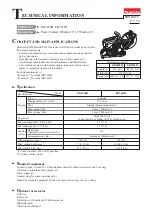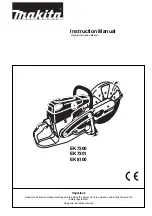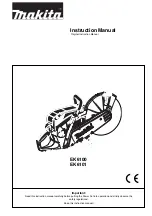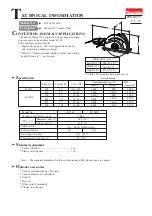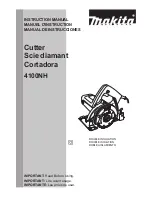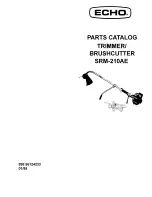
Varan Motors
BCIE SARL, gruuss-strooss 28, 9991 Weiswampach, Luxembourg
T: 00352/26908036 – F: 00352/26908040
SPT-15103
SPT-15105
Repetitive Motions Hazards
•
When using this tool to perform work-related activities, the operator can experience discomfort
in the hands, arms, shoulders, neck or other parts of the body
•
While using this tool, the operator should adopt a comfortable posture whilst maintaining secure
footing and avoiding awkward or off-balance postures. The operator should change posture
during extended tasks; this can help avoid discomfort and fatigue
•
If the operator experiences symptoms such as persistent or recurring discomfort, pain,
throbbing, aching, tingling, numbness, burning sensations or stiffness, these warning signs
should not be ignored. The operator should inform the employer and consult a qualified health
professional
Accessory Hazards
•
Disconnect the tool from the energy supply before fitting or changing the inserted tool or
accessory
•
Avoid direct contact with the inserted tool during and after use, as it can be hot or sharp
•
Use only sizes and types of accessories and consumables that are recommended by the
manufacturer of this tool; do not use other types or sizes of accessories or consumables
•
Grinding discs should not be used
•
Check that the maximum operating speed of the cutting disc is higher than the rated speed of
the tool
Workplace Hazards
•
Slips, trips and falls are major causes of workplace injury. Be aware of slippery surfaces caused by
use of the tool and also of trip hazards caused by the air line or hydraulic hose
•
This tool is not intended for use in potentially explosive atmospheres and is not insulated against
contact with electric power
•
Ensure that there are no electrical cables, gas pipes, etc., which can cause a hazard if damaged
by use of the tool
Dust and Fume Hazards
•
Dust and fumes generated when using this tool can cause ill health (for example cancer, birth
defects, asthma and/or dermatitis); risk assessment and implementation of appropriate controls
for these hazards are essential
•
Risk assessment should include dust created by the use of the tool and the potential for
disturbing existing dust
•
Operate and maintain this tool as recommended in these instructions, to minimise dust or fume
emissions
•
Direct the exhaust so as to minimise disturbance of dust in a dust-filled environment
•
Where dust or fumes are created, the priority should be to control them at the point of emission
•
All integral features or accessories for the collection, extraction or suppression of airborne dust
or fumes should be correctly used and maintained in accordance with the manufacturer’s
instructions
•
Select, maintain and replace the consumable/inserted tool as recommended in the instruction
handbook, to prevent an unnecessary increase in dust or fumes
•
Use respiratory protection in accordance with employer's instructions and as required by
occupational health and safety regulations
Noise Hazards
•
Exposure to high noise levels can cause permanent, disabling hearing loss and other problems,
such as tinnitus (ringing, buzzing, whistling or humming in the ears). Therefore, risk assessment
and implementation of appropriate controls for these hazards are essential
•
Appropriate controls to reduce the risk can include actions such as damping materials to prevent
workpieces from ‘ringing’
•
Use hearing protection in accordance with employer's instructions and as required by
occupational health and safety regulations
































